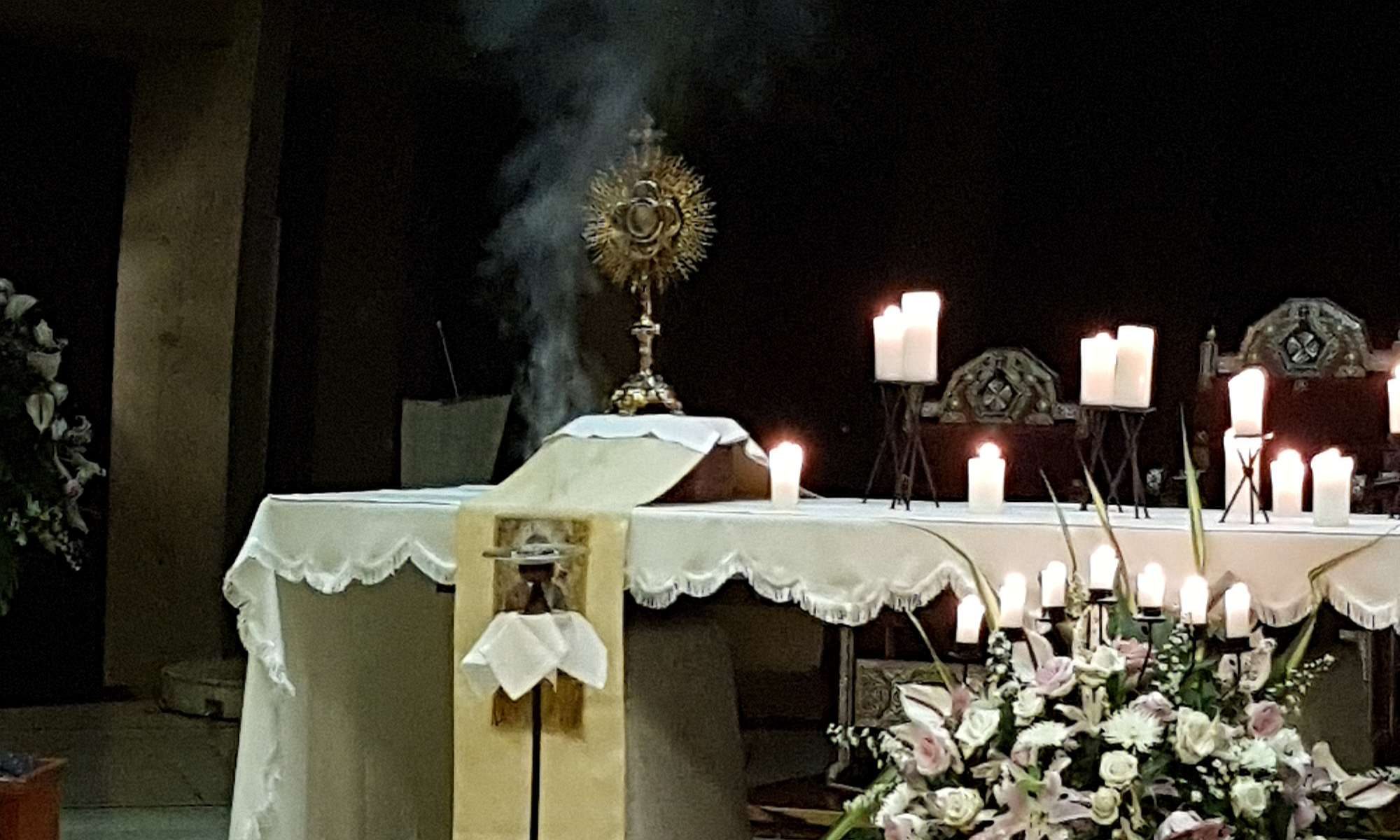Quien no reconoce una naturaleza humana tampoco reconoce que hay leyes vinculantes que nos ayudan a encontrar nuestro genuino bien.
Cuaresma 2012, 3 de 3, Comunidad
[Retiro de Cuaresma, 2012, para la Comunidad Hispana en Lafayette, Louisiana.]
Tema 3 de 3: Comunidad en el Amor de Cristo.
* Del carril para llevar varios pasajeros (el “car pool” de las autopistas norteamericanas) podemos aprender que sólo en comunidad es posible ir mejor, más seguro y más rápido hacia la meta. Eso se cumple en la vida de fe también.
* El apóstol san Pablo ofrece en su Carta a los Filipenses, capítulo 2, una recomendación para construir comunidad: que todos miremos a Cristo, y que de Él aprendamos la humildad, la caridad y la obediencia.
Cuaresma 2012, 2 de 3, Discernimiento
[Retiro de Cuaresma, 2012, para la Comunidad Hispana en Lafayette, Louisiana.]
Tema 2 de 3: Discernimiento.
* “Recargar nuestra fe” no es sólo asunto de mayor impulso (motor) sino también de tomar la ruta correcta (dirección). Por eso necesitamos discernimiento.
* El primer y fundamental espacio para la verdad en nuestra vida es aquel “secreto” del que habla Cristo en el capítulo 6 de San Mateo. Cuando buscamos ser verdaderos ante Dios, sin que importe el aplauso o burla de la gente, ganamos esa luz que en verdad puede orientarnos.
* A la luz de esa verdad, nuestros temores, nuestra idea de “éxito” y nuestra manera de servir a los demás toman un nuevo aspecto, marcado por el estilo de Jesucristo.
Cuaresma 2012, 1 de 3, Oracion que da vida
[Retiro de Cuaresma, 2012, para la Comunidad Hispana en Lafayette, Louisiana.]
Tema 1 de 3: Oración que da vida.
* En el hermoso relato simbólico de la creación del hombre, Dios da de su propio espíritu a su creatura. Ello refleja la vocación más propia nuestra: tener la vida de Dios y vivir próximos a Él.
* El Apocalipsis, capítulo 3, nos advierte que hay personas que “tienen nombre de vivo, pero están muertas.” Pero Joel 3 nos cuenta que “después de todo” Dios puede dar con abundancia su Espíritu “sobre toda carne.” En ese Espíritu es posible una vida nueva.
LA GRACIA del Martes 13 de Marzo de 2012
El perdón, como otras bendiciones de Dios, sólo puede abundar en nosotros si lo pasamos a otros.
LA GRACIA del Lunes 12 de Marzo de 2012
Nadie se perdió tanto de conocer a Jesús como aquellos que creían que ya lo conocían.
LA GRACIA del Domingo 11 de Marzo de 2012
Hay un valor permanente en los mandamientos que Dios nos dio por medio de Moisés, pero la plenitud de su voz sólo resuena en su Hijo, palabra eterna.
LA GRACIA del Sabado 10 de Marzo de 2012
Perdonar es algo tan próximo a crear, que uno de los elogios mayores al poder de Dios es la afirmación de que Él sí perdona.
LA GRACIA del Viernes 9 de Marzo de 2012
Dos enseñanzas: (1) El pecado termina engendrando muerte. (2) A un cierto punto, uno debe optar entre los bienes de Dios, y el Dios que es todo bien.
LA GRACIA del Jueves 8 de Marzo de 2012
Cristo quiere que reconozca mi nombre en aquel que tiene tanto para compartir.
LA GRACIA del Miercoles 7 de Marzo de 2012
No puede quitarse del Evangelio el sacrificio porque hay unos, muy poderosos, que sacan provecha de las cadenas del pecado.
LA GRACIA del Martes 6 de Marzo de 2012
Ya la incoherencia es un mal muy grande, pero peor aún es la situación del arrogante, que fácilmente cae en auto-engaño.
LA GRACIA del Lunes 5 de Marzo de 2012
El arrepentimiento es parte integral de la cuaresma porque trae liberación y abre espacio al bien.
LA GRACIA del Domingo 4 de Marzo de 2012
Si el Padre celestial sacrifica a su Hijo, en ello está la señal imborrable de un amor que vence todo.
LA GRACIA del Sabado 3 de Marzo de 2012
Cuaresma: tiempo para sacudir el moho de la mediocridad, la frazada de la pereza y el yunque de la cobardía.
LA GRACIA del Viernes 2 de Marzo de 2012
Reconciliación y conversión: señales de que creemos que el futuro puede ser sustancialmente mejor que el presente.
